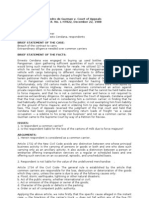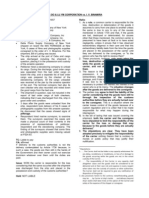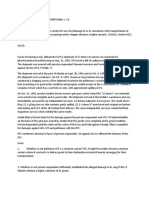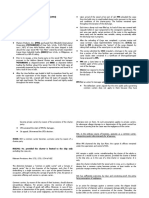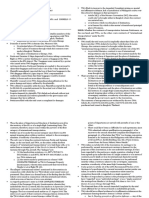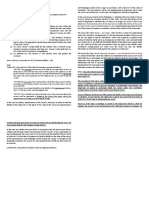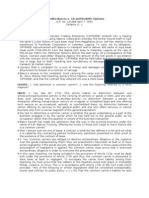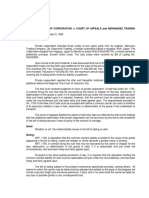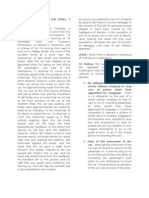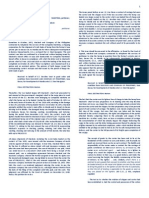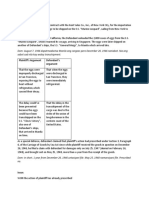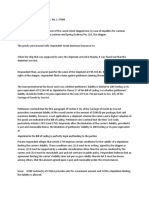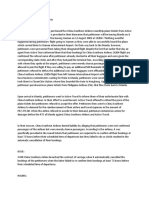0 ratings0% found this document useful (0 votes)
285 viewsCompania Maritima v. Insurance Company of North America
Compania Maritima v. Insurance Company of North America
Uploaded by
Rosanne SoliteThe Supreme Court held that (1) a contract of carriage existed between the shipping company and the shipper even though the goods were loaded onto the shipping company's lighter and not the actual vessel, as loading the goods onto the lighter was part of the carriage contract, and (2) the sinking of the lighter was not due to a fortuitous event but rather a lack of precaution by the carrier, as the lighter was shown to be unseaworthy with cracks in its bottom.
Copyright:
© All Rights Reserved
Available Formats
Download as DOCX, PDF, TXT or read online from Scribd
Compania Maritima v. Insurance Company of North America
Compania Maritima v. Insurance Company of North America
Uploaded by
Rosanne Solite0 ratings0% found this document useful (0 votes)
285 views2 pagesThe Supreme Court held that (1) a contract of carriage existed between the shipping company and the shipper even though the goods were loaded onto the shipping company's lighter and not the actual vessel, as loading the goods onto the lighter was part of the carriage contract, and (2) the sinking of the lighter was not due to a fortuitous event but rather a lack of precaution by the carrier, as the lighter was shown to be unseaworthy with cracks in its bottom.
Original Description:
transportation case digest
Copyright
© © All Rights Reserved
Available Formats
DOCX, PDF, TXT or read online from Scribd
Share this document
Did you find this document useful?
Is this content inappropriate?
The Supreme Court held that (1) a contract of carriage existed between the shipping company and the shipper even though the goods were loaded onto the shipping company's lighter and not the actual vessel, as loading the goods onto the lighter was part of the carriage contract, and (2) the sinking of the lighter was not due to a fortuitous event but rather a lack of precaution by the carrier, as the lighter was shown to be unseaworthy with cracks in its bottom.
Copyright:
© All Rights Reserved
Available Formats
Download as DOCX, PDF, TXT or read online from Scribd
Download as docx, pdf, or txt
0 ratings0% found this document useful (0 votes)
285 views2 pagesCompania Maritima v. Insurance Company of North America
Compania Maritima v. Insurance Company of North America
Uploaded by
Rosanne SoliteThe Supreme Court held that (1) a contract of carriage existed between the shipping company and the shipper even though the goods were loaded onto the shipping company's lighter and not the actual vessel, as loading the goods onto the lighter was part of the carriage contract, and (2) the sinking of the lighter was not due to a fortuitous event but rather a lack of precaution by the carrier, as the lighter was shown to be unseaworthy with cracks in its bottom.
Copyright:
© All Rights Reserved
Available Formats
Download as DOCX, PDF, TXT or read online from Scribd
Download as docx, pdf, or txt
You are on page 1of 2
COMPANIA MARITIMA V.
INSURANCE COMPANY OF NORTH AMERICA
GR NO. L-18965, OCTOBER 30, 1964
The goods were not yet actually loaded on the vessel which would carry the hemp to its destination and
that no bill of lading was issued when the vessel sank. SC held that this fact is irrelevant, and that the
contract of carriage already commenced when the shipping company’s lighters went to shipper’s private
pier to get the goods.
FACTS:
Macleod and Company of the Philippines contracted by telephone the services of the Compañia Maritima
(CM), a shipping corporation, for shipment of hemp from the Macleod's Sasa private pier at Davao City to
Manila to be subsequently transhipped to Boston.
This oral contract was later on confirmed and the loading of the hemp was completed when CM sent 2
private lighters to Macelod’s pier. The 2 lighters were manned each by a patron and an assistant patron.
One of the lighters sank, resulting in the damage or loss of 1,162 bales of hemp loaded therein. All abaca
shipments of Macleod were insured with the Insurance Company of North America. Macleod filed a claim
for the loss it suffered with the insurance company and was paid P64,018.55.
The insurance company failing to recover from the carrier instituted the present action.
CA and RTC both ordered CM to pay the insurance company.
ISSUES:
(1)Was there a contract of carriage between the carrier and the shipper even if the loss occurred when the
hemp was loaded on a barge owned by the carrier which was loaned free of charge and was not actually
loaded on the S.S. Bowline Knot (Compania Maritima’s ship) which would carry the hemp to Manila and
no bill of lading was issued therefor?; YES
(2)Was the damage caused to the cargo or the sinking of the barge where it was loaded due to a fortuitous
event, storm or natural disaster that would exempt the carrier from liability?; NO
HELD:
1. YES. The fact that the carrier sent its lighters free of charge to take the hemp from Macleod's
wharf at Sasa preparatory to its loading unto the ship Bowline Knot does not in any way impair the
contract of carriage already entered into between the carrier and the shipper, for that preparatory steps is
but a part and parcel of said contract of carriage.
In other words, here we have a complete contract of carriage the consummation of which has already
begun: the shipper delivering the cargo to the carrier, and the latter taking possession thereof by placing
it on a lighter manned by its authorized employees, under which Macleod became entitled to the privilege
secured to him by law for its safe transportation and delivery, and the carrier to the full payment of its
freight upon completion of the voyage.
The liability and responsibility of the carrier under a contract for the carriage of goods commence on their
actual delivery to, or receipt by, the carrier or an authorized agent. Delivery to a lighter in charge of a
vessel for shipment on the vessel, where it is the custom to deliver in that way, is a good delivery and
binds the vessel receiving the freight, the liability commencing at the time of delivery to the lighter.
A bill of lading is not indispensable for the creation of a contract of carriage. As regards the form of the
contract of carriage it can be said that provided that there is a meeting of the minds and from such
meeting arise rights and obligations, there should be no limitations as to form.' The bill of lading is not
essential to the contract, although it may become obligatory by reason of the regulations of railroad
companies, or as a condition imposed in the contract by the agreement of the parties themselves.
2. The mishap that caused the damage or loss was due, not to force majeure, but to lack of
adequate precaution or measures taken by the carrier to prevent the loss as may be inferred.
The ill-fated barge had cracks on its bottom which admitted sea water in the same manner as rain
entered 'thru tank manholes,' according to the patron of LCT No. 1023 conclusively showing that the
barge was not seaworthy it should be noted that on the night of the nautical accident there was no storm,
flood, or other natural disaster or calamity. Certainly, winds of 11 miles per hour, although stronger than
the average 4.6 miles per hour then prevailing in Davao on October 29, 1952 , cannot be classified as
storm.
You might also like
- Case Digest, Pedro de Guzman vs. CADocument2 pagesCase Digest, Pedro de Guzman vs. CARyan JD Lim100% (9)
- Negros Navigation Co., InC Vs CA, R. MirandaDocument2 pagesNegros Navigation Co., InC Vs CA, R. Mirandaトレンティーノ アップル100% (1)
- Case Digest For Mitsui v. CA, 287 SCRA 366Document1 pageCase Digest For Mitsui v. CA, 287 SCRA 366Justice Prevails50% (2)
- Daraz Packaging GuidelinesDocument22 pagesDaraz Packaging GuidelinesDaraz Seller Support83% (6)
- Case UcpDocument1 pageCase UcpBilal AhmadNo ratings yet
- Basic ComputationDocument13 pagesBasic ComputationAira Oligario86% (7)
- AQIS TemplateDocument3 pagesAQIS TemplateNghia PtNo ratings yet
- Tabacalera Insurance Co. v. North Front Shipping Services Inc.Document2 pagesTabacalera Insurance Co. v. North Front Shipping Services Inc.Mikee RañolaNo ratings yet
- Lu Do V BinamiraDocument1 pageLu Do V BinamiracamilleholicNo ratings yet
- Compania MARITIMA V. INSURANCE CO. OF NORTH AMERICADocument2 pagesCompania MARITIMA V. INSURANCE CO. OF NORTH AMERICADamnum Absque InjuriaNo ratings yet
- MACAM V CADocument3 pagesMACAM V CAab_munsayac3434No ratings yet
- Maersk Line Vs CA DigestDocument2 pagesMaersk Line Vs CA DigesttoniprueNo ratings yet
- Philippine Charter Insurance Corporation Vs ChemoilDocument2 pagesPhilippine Charter Insurance Corporation Vs ChemoilWonder WomanNo ratings yet
- Admirality Case DigestDocument3 pagesAdmirality Case DigestElle BarrancoNo ratings yet
- Unsworth Transport International v. CADocument3 pagesUnsworth Transport International v. CARosanne SoliteNo ratings yet
- CD - Caltex (Philippines), Inc. vs. Sulpicio LinesDocument2 pagesCD - Caltex (Philippines), Inc. vs. Sulpicio LinesMhaliNo ratings yet
- American Home Assurance v. CADocument1 pageAmerican Home Assurance v. CAChilzia RojasNo ratings yet
- Air Transpo DigestsDocument6 pagesAir Transpo DigestsMis Dee100% (1)
- Delsan v. AHAC DigestDocument1 pageDelsan v. AHAC DigestAR Reburiano100% (1)
- A.F. SANCHEZ BROKERAGE INC Vs CADocument2 pagesA.F. SANCHEZ BROKERAGE INC Vs CAEmNo ratings yet
- Sabena Belgian World Airlines vs. Hon. Court of Appeals and Ma. Paula San AgustinDocument8 pagesSabena Belgian World Airlines vs. Hon. Court of Appeals and Ma. Paula San AgustinYi FanNo ratings yet
- Delsan Transport Lines Inc Vs CADocument1 pageDelsan Transport Lines Inc Vs CAShie La Ma RieNo ratings yet
- Roldan v. Lim Ponzo Co.Document1 pageRoldan v. Lim Ponzo Co.myschNo ratings yet
- Calvo vs. UCPB Gen. Insurance Co.,Inc.Document2 pagesCalvo vs. UCPB Gen. Insurance Co.,Inc.Justine Camille Rivera100% (1)
- Asia Lighterage and Shipping Inc Vs CA GR 147246 Aug 19 2003Document2 pagesAsia Lighterage and Shipping Inc Vs CA GR 147246 Aug 19 2003Bibo GuntherNo ratings yet
- G.R. No. 114167 July 12, 1995 Coastwise Lighterage Corporation, Petitioner, Vs - Court of Appeals and The Philippine General Insurance Company, RespondentsDocument1 pageG.R. No. 114167 July 12, 1995 Coastwise Lighterage Corporation, Petitioner, Vs - Court of Appeals and The Philippine General Insurance Company, RespondentsJIEZFA100% (1)
- Sarkies Tours Philippines, Inc., V. CADocument2 pagesSarkies Tours Philippines, Inc., V. CAJustine Camille RiveraNo ratings yet
- Lu Do v. BinamiraDocument2 pagesLu Do v. BinamiraquasideliksNo ratings yet
- Case Name: Philippine Airlines v. Court of Appeals GR No. L-46558 Date: July 31, 1981 By: Del Rosario, Keren Michelle P. Topic: Strict LiabilityDocument3 pagesCase Name: Philippine Airlines v. Court of Appeals GR No. L-46558 Date: July 31, 1981 By: Del Rosario, Keren Michelle P. Topic: Strict Liability123abc456defNo ratings yet
- Filipino Merchants Insurance Vs CADocument2 pagesFilipino Merchants Insurance Vs CAAngela Marie AlmalbisNo ratings yet
- Planters Products Inc v. CADocument3 pagesPlanters Products Inc v. CAJoshua OuanoNo ratings yet
- Eastern Shipping Vs PrudentialDocument2 pagesEastern Shipping Vs PrudentialPrincess Kimberly Ubay-ubayNo ratings yet
- Transpo Digests 3.20.17Document20 pagesTranspo Digests 3.20.17RL N DeiparineNo ratings yet
- Mapa V CADocument3 pagesMapa V CAGertrude ArquilloNo ratings yet
- Baliwag Transit Inc. v. CA G.R. No. 116110. May 15,1996 CaseDocument2 pagesBaliwag Transit Inc. v. CA G.R. No. 116110. May 15,1996 CaseDaniel DantesNo ratings yet
- Case Digest, Everett Steamship vs. CADocument2 pagesCase Digest, Everett Steamship vs. CAZainalee Dawn100% (3)
- Chua Yek Hong vs. IACDocument2 pagesChua Yek Hong vs. IACMae Navarra100% (4)
- 06) Luzon Stevedoring Corp v. CADocument2 pages06) Luzon Stevedoring Corp v. CAWendy Peñafiel100% (2)
- Pilapil V CA GR 52159 Dec 22Document3 pagesPilapil V CA GR 52159 Dec 22shaneAAshaneNo ratings yet
- Transpo ConsoDigests2ndBatchDocument37 pagesTranspo ConsoDigests2ndBatchArman DalisayNo ratings yet
- Digest of Bascos v. CA (G.R. No. 101089)Document2 pagesDigest of Bascos v. CA (G.R. No. 101089)Rafael Pangilinan100% (3)
- Asia Lighterage & Shipping Vs CADocument3 pagesAsia Lighterage & Shipping Vs CAShierii_ygNo ratings yet
- Transpo - Saludo Vs Court of AppealsDocument1 pageTranspo - Saludo Vs Court of AppealsRalph ValdezNo ratings yet
- Air France vs. GillegoDocument2 pagesAir France vs. Gillegoclvnngc100% (1)
- Southern Lines Vs CADocument2 pagesSouthern Lines Vs CAthesupersecretsecretNo ratings yet
- Transpo Case Digest For MidtermDocument54 pagesTranspo Case Digest For MidtermBong Osorio100% (1)
- Everett Steamship Corporation Vs Court of Appeals and Hernandez Trading CoDocument2 pagesEverett Steamship Corporation Vs Court of Appeals and Hernandez Trading CoAndrea GerongaNo ratings yet
- Government v. YnchaustiDocument2 pagesGovernment v. YnchaustiIris GallardoNo ratings yet
- Caltex Vs Sulpicio LinesDocument2 pagesCaltex Vs Sulpicio LinesElle SyNo ratings yet
- Del Prado Vs MeralcoDocument3 pagesDel Prado Vs Meralcolordpuppa100% (1)
- Caltex V Sulpicio (Transpo)Document2 pagesCaltex V Sulpicio (Transpo)Kio Paulo Hernandez SanAndres100% (2)
- Fortune Express Vs CA DigestDocument2 pagesFortune Express Vs CA DigestKryzel V. LaurenaNo ratings yet
- Delgado Brothers Inc. v. Home Insurance IncDocument1 pageDelgado Brothers Inc. v. Home Insurance IncVener MargalloNo ratings yet
- National Development Co. v. Court of AppealsDocument2 pagesNational Development Co. v. Court of AppealsNoreenesse SantosNo ratings yet
- Transpo Case DigestsDocument28 pagesTranspo Case DigestsClaudette Pearl De LeonNo ratings yet
- Transpo 2Document11 pagesTranspo 2SALMAN JOHAYRNo ratings yet
- Transpo DigestDocument2 pagesTranspo DigestMis DeeNo ratings yet
- Sulpicio Lines v. CADocument2 pagesSulpicio Lines v. CARhea BarrogaNo ratings yet
- G.R. No. L-47822 - de Guzman v. Court of AppealsDocument4 pagesG.R. No. L-47822 - de Guzman v. Court of AppealsMegan Aglaua100% (1)
- Ninos CasesDocument12 pagesNinos CasesEj LeaNo ratings yet
- B11. Transpo DigestDocument2 pagesB11. Transpo DigestMichael VillalonNo ratings yet
- 102 Compañia Maritima v. Insurance Company of North America, G.R. No. L-18965 (October 30, 1964)Document2 pages102 Compañia Maritima v. Insurance Company of North America, G.R. No. L-18965 (October 30, 1964)Ruby Santillana100% (1)
- Compañia Maritima vs. Insurance Company of North America, 12 SCRA 213, No. L-18965 October 30, 1964Document6 pagesCompañia Maritima vs. Insurance Company of North America, 12 SCRA 213, No. L-18965 October 30, 1964Sam WelbyNo ratings yet
- G.R. No. L-18965 October 30, 1964 Compañia Maritima, Petitioner, vs. Insurance Company of North America, RespondentDocument74 pagesG.R. No. L-18965 October 30, 1964 Compañia Maritima, Petitioner, vs. Insurance Company of North America, RespondentLio de LeonNo ratings yet
- Boudard VS TaitDocument2 pagesBoudard VS TaitRosanne SoliteNo ratings yet
- Juanita Ermitaño v. Lailanie M. PaglasDocument2 pagesJuanita Ermitaño v. Lailanie M. PaglasRosanne SoliteNo ratings yet
- Romeo F. Edu v. Amador E. GomezDocument2 pagesRomeo F. Edu v. Amador E. GomezRosanne SoliteNo ratings yet
- Boudard VS TaitDocument2 pagesBoudard VS TaitRosanne SoliteNo ratings yet
- Nagarmull Vs Binalbagan Isabela Case DigestDocument7 pagesNagarmull Vs Binalbagan Isabela Case DigestRosanne SoliteNo ratings yet
- Lim v. Court of AppealsDocument2 pagesLim v. Court of AppealsRosanne Solite100% (2)
- Cabal v. KapunanDocument2 pagesCabal v. KapunanRosanne SoliteNo ratings yet
- Cabal v. KapunanDocument1 pageCabal v. KapunanRosanne Solite50% (2)
- Rubiso V RiveraDocument2 pagesRubiso V RiveraRosanne SoliteNo ratings yet
- Wallem Philippines Shipping V SR FarmsDocument2 pagesWallem Philippines Shipping V SR FarmsRosanne SoliteNo ratings yet
- Ucpb General Insurance V Aboitiz Shipping Corp.Document2 pagesUcpb General Insurance V Aboitiz Shipping Corp.Rosanne SoliteNo ratings yet
- Poiland Industrial Limited V National Development CompanyDocument2 pagesPoiland Industrial Limited V National Development CompanyRosanne Solite100% (1)
- Liao vs. American PresidentDocument3 pagesLiao vs. American PresidentRosanne SoliteNo ratings yet
- Eastern V Great American, G.R. No. L-37604Document2 pagesEastern V Great American, G.R. No. L-37604Rosanne SoliteNo ratings yet
- Ramos V China Southern AirlinesDocument3 pagesRamos V China Southern AirlinesRosanne SoliteNo ratings yet
- Philippines First v. WallemDocument2 pagesPhilippines First v. WallemRosanne SoliteNo ratings yet
- Unsworth Transport International v. CADocument3 pagesUnsworth Transport International v. CARosanne SoliteNo ratings yet
- Union Carbide Philippines Vs Manila Railroad Co.Document3 pagesUnion Carbide Philippines Vs Manila Railroad Co.Rosanne SoliteNo ratings yet
- Nedlloyd Lijnen B.V. Rotterdam and The East Asiatic Co., LTD., vs. Glow Laks Enterprises, Ltd.Document3 pagesNedlloyd Lijnen B.V. Rotterdam and The East Asiatic Co., LTD., vs. Glow Laks Enterprises, Ltd.Rosanne SoliteNo ratings yet
- Cathay Pacific Airways V ReyesDocument4 pagesCathay Pacific Airways V ReyesRosanne Solite50% (2)
- Yokohama Tire Phils vs. Yokohama Employees UnionDocument2 pagesYokohama Tire Phils vs. Yokohama Employees UnionRosanne SoliteNo ratings yet
- Benito Macam vs. Court of AppealsDocument2 pagesBenito Macam vs. Court of AppealsRosanne SoliteNo ratings yet
- Amparo C. Servando v. Philippine Steam NavigationDocument2 pagesAmparo C. Servando v. Philippine Steam NavigationRosanne Solite100% (1)
- Kapalaran Bus Line vs. Angel CoronadoDocument4 pagesKapalaran Bus Line vs. Angel CoronadoRosanne SoliteNo ratings yet
- Delsan Transport Lines, Inc., vs. American Home Assurance CorporationDocument2 pagesDelsan Transport Lines, Inc., vs. American Home Assurance CorporationRosanne SoliteNo ratings yet
- Lydia Sumipat v. Brigido BangaDocument2 pagesLydia Sumipat v. Brigido BangaRosanne SoliteNo ratings yet
- Toyota Motor Phils Workers Asso - VS.NLRCDocument7 pagesToyota Motor Phils Workers Asso - VS.NLRCRosanne SoliteNo ratings yet
- ContractsDocument15 pagesContractsSonakshiFaujdarNo ratings yet
- Material Handling: A Power Point Presentation OnDocument16 pagesMaterial Handling: A Power Point Presentation OnDamodharan RathanaveluNo ratings yet
- Seastar Ship Management Private Limited: Application / Personal Data Form For Officer'S & RatingsDocument4 pagesSeastar Ship Management Private Limited: Application / Personal Data Form For Officer'S & RatingsrupalNo ratings yet
- Letter of Credit GuideDocument50 pagesLetter of Credit GuideMohamed Naji100% (5)
- To What Extent Do The Incoterms 2000 Determine The Passing of Risk in A Sale Contract On Shipment Terms?Document19 pagesTo What Extent Do The Incoterms 2000 Determine The Passing of Risk in A Sale Contract On Shipment Terms?shahriar2004No ratings yet
- Sales Order ProcessDocument30 pagesSales Order ProcessMuhammad Adnan100% (1)
- Petroleum AgreementDocument3 pagesPetroleum AgreementbenNo ratings yet
- Liebherr Floating Transfer Solutions OverviewDocument16 pagesLiebherr Floating Transfer Solutions OverviewHùng Lê VănNo ratings yet
- Defining Transport Logistics: A Literature Review and Practitioner Opinion Based ApproachDocument8 pagesDefining Transport Logistics: A Literature Review and Practitioner Opinion Based ApproachAbbey Guias AquinoNo ratings yet
- Sylabus of Container Terminal OperationsDocument5 pagesSylabus of Container Terminal Operations77APACHEMUSICNo ratings yet
- Eum 20180814Document22 pagesEum 20180814Victor FernandezNo ratings yet
- A KPI-driven Approach To Tactical and Operational ControlDocument12 pagesA KPI-driven Approach To Tactical and Operational ControlGaluizu001No ratings yet
- BIR - RMO No 14-2014Document8 pagesBIR - RMO No 14-2014PortCalls100% (2)
- FedEx Shipping LabelDocument3 pagesFedEx Shipping Labelalaa.abdalrazeq99No ratings yet
- Documents Used in Foreign TradeDocument20 pagesDocuments Used in Foreign TradeSatish Pawar100% (14)
- COMPLAINT AND ADJUSTMENT LÝ THUYẾT OFFICIALDocument9 pagesCOMPLAINT AND ADJUSTMENT LÝ THUYẾT OFFICIALReikoAiNo ratings yet
- Study of Indian Railway - SynopsisDocument2 pagesStudy of Indian Railway - SynopsiskristokunsNo ratings yet
- Ams Aci Ens FillingDocument17 pagesAms Aci Ens Fillingduy phanNo ratings yet
- Reorder PointDocument23 pagesReorder PointMary Grace Ramos BalbonaNo ratings yet
- Ship2shore Magazine 24-WEBDocument28 pagesShip2shore Magazine 24-WEBAllen ChowNo ratings yet
- Lecture Preparation Unit 4Document50 pagesLecture Preparation Unit 4Prem VikasNo ratings yet
- DTDCDocument9 pagesDTDCSamarendra ChakrabortyNo ratings yet
- Rajat AroraDocument30 pagesRajat AroraBibhu Ranjan MohantyNo ratings yet
- QT STW 240006897Document2 pagesQT STW 240006897nazulailaNo ratings yet
- Your Service Selection and RateDocument3 pagesYour Service Selection and RateSalomon GuevaraNo ratings yet
